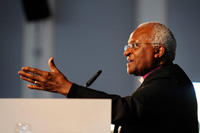Freie Universität Berlin Presents Nobel Peace Prize Laureate Desmond Tutu with the Freedom Award
University Honors Tutu’s Commitment to the Struggle for Equal Opportunities
№ 199/2009 from Jul 17, 2009
South African Archbishop and Nobel Peace Prize laureate Desmond Tutu during his acceptance speech for the Freedom Award at Freie Universität Berlin on July 17, 2009
Image Credit: Peter Himsel
This year, Freie Universität Berlin has presented its International Freedom Award to South African Archbishop and Nobel Peace Prize Laureate Desmond Tutu. The presentation ceremony was attended by a range of well-known personalities. The decision to honor Desmond Tutu with this award specifically highlighted how his unrelenting efforts to support equal opportunities – in words, deeds, and in his faith – have made him into an outstanding role model for reconciliation and nonviolent commitment to peace. Moreover, his work has provided an invaluable service to human rights and the ideal of freedom. The speech in his honor was given by Annette Schavan, Federal Minister of Education and Research, in the Henry Ford Building.
Desmond Mpilo Tutu (born 1931) became a symbol of the struggle against apartheid in South Africa. Although initially trained as teacher, he resigned from his job in 1958 as a protest against the South African educational system. In 1961, after studying theology, he was ordained as an Anglican priest. In 1978, he was the first black person ever to become elected as the Secretary-General of the South African Council of Churches. Rejecting any form of violence, he continued to work unceasingly to achieve reconciliation between the different sections of the population. Desmond Tutu was awarded the 1984 Nobel Peace Prize in recognition of his peaceful campaign to create a free and democratic society.
During his years as Archbishop of Cape Town from 1986 to 1996, he directed his efforts at finding a peaceful settlement to the conflict in South Africa. In 1995, then South African President Nelson Mandela appointed Desmond Tutu as Chairman of the Truth and Reconciliation Committee, an organization dedicated to investigating human rights violations during the apartheid period. Desmond Tutu is regarded as a moral voice and champion for reconciliation and understanding. He is Chairman of The Elders, an international group of leading world figures, including peace activists, human rights activists, and intellectuals, pursuing solutions for pressing global problems.
Freie Universität's Freedom Award honors persons who have served freedom in a political, social, or academic context. In 2008, the award was presented to former Polish Foreign Minister Wladyslaw Bartoszewski and in 2007 to Kim Dae-jung, the former South Korean President and Nobel Peace Prize Laureate.

